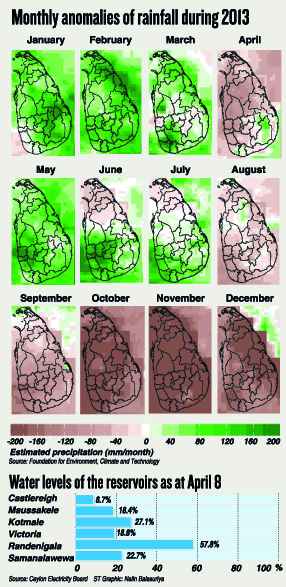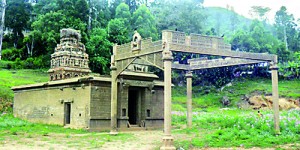News
Experts warn: Avert conflicts over energy-food nexus
Water for food is a core issue that can no longer be tackled through a narrow sectorial approach, a major international conference held  in Colombo last week was told.
in Colombo last week was told.
Nearly 500 experts from 40 countries participated in the three-day Fifth International Conference on Water Resources and Hydropower Development in Asia at the BMICH.
Addressing the summit, senior minister Dr.Sarath Amunugama said native topography meant that Sri Lanka “was made for hydropower”, which is a vital contributor to economic growth.
Dr Avinash Tyagi, Secretary General of International Commission on Irrigation and Drainage (ICID), focused in his keynote address on reservoir operations during drought conditions – an issue of great relevance to Sri Lanka.
He began by underlining the need to recognise the “water-energy-food nexus” and outlined concerns about water security, particularly in the light of climate change.
This has been particularly relevant to Sri Lanka as evident in the severe drought Sri Lanka faced in 2012.
There was insufficient water in the reservoirs to be released for farming at height of the drought and it was alleged that the then minister of power and energy had asked officials to use reservoir water stocks to generate hydro-electricity to gain revenue for the Ceylon Electricity Board (CEB).
In doing so, the minister managed to bring down the CEB’s power-generating costs which otherwise would have soared with having to resort more to thermal power plants, but in the process the water stocks that should have been kept for irrigation in prolonged drought has been exhausted. This has led to protests by paddy farmers who had to witness their paddy lands dying without water.
This highlights the interlinking of different water usage and the need to carefully manage water stocks among stakeholders, especially for energy and food.
In Sri Lanka, water from multipurpose reservoirs been released for various demands which brings to a head the need to manage water wisely to face drought conditions.
The water-energy-food nexus was a highlight of the recently-launched World Water Development report, “Water and Energy”, which said that recognising the many synergies and trade-offs between water and energy use and food production and balancing these trade-offs was central to ensuring water, energy and food security.
In Sri Lanka, the allocation of water for different needs is periodically assessed with major stakeholders such as the CEB, the Irrigation Department, Farmers Association, Water Board and the Mahaweli Authority. The process is handled by the Mahaweli Authority and water releases are supposed to be made in accordance with this plan.
Since there are different departments working toward different needs, it was proposed several years ago that an apex body be set up to manage water resources but this has not materialised. Experts also stressed the need of drawing the Meteorological Department too into the planning stage of water sharing as rainfall patterns grow increasingly unreliable.
| Sri Lankan a lead author of elite UN report
Sri Lankan Achala C. Abeysinghe is a lead author of the latest report by the United Nations’ Intergovernmental Panel on Climate Change (IPCC), the main international body for assessing the science related to climate change. The IPCC, which has won a Nobel Prize for its work, analyses the body of scientific knowledge through three working groups, and its fifth and latest report is a product of Working Group II, which considered climate change in relation to observed impacts and future risks, the potential for and limits to adaptation, and importantly, the vulnerability and exposure of human and natural systems to this change. A total of 309 co-ordinating lead authors, lead authors, and review editors drawn from 70 countries were selected to produce the latest report. They enlisted the help of 436 contributing authors and 1729 expert and government reviewers. This elite report consists of 30 chapters and Sri Lankans could be proud that a lead author of its 20th chapter, “Climate-Resilient Pathways: Adaptation, Mitigation, and Sustainable Development” is Dr Abeysinghe, who holds a PhD in international environmental law on climate change. Her stated interests lie in equity and fairness issues in international climate change negotiations, adaptation to climate change, finance for climate change adaptation and issues related to loss and damage. Dr Abeysinghe works for the respected London-based International Institute for Environment and Development where she is Senior Researcher of the Climate Change Group and Team Leader, Global Climate Change Governance. She gained her first degree from the University of Colombo and worked as an attorney-at-law in the Supreme Court and was a law lecturer at the Open University of Sri Lanka. As well as contributing significantly to the latest IPCC report, Dr Abeysinghe’s current positions include being legal and technical adviser to the Chair of the Least Developed Countries (LDC) group for the UN Framework Convention on Climate Change and Head of the European Capacity Building Initiative workshops programme. Growing confidence in climate reports but localised studies crucial Twelve pots of water from the 12 main hydro reservoirs were brought down to Anuradhapura by special motorcade and, after paying tribute at the Ruwanweliseya, were offered to the sacred Bodhi tree with an appeal to the deities for good rains.  A kovil that was submerged now appearing in drought-hit Maussakele. Pic by Kogulan This annual ceremony had added fervency last week with climate change producing little answer to the prolonged drought that will see rice shortages by August, hydropower generation at a record low and a global report warning of increasing suffering from global warming. The report, “Climate Change 2014: Impacts, Adaptation, and Vulnerability” by IPCC Working Group 2 in which Sri Lankan environmental law specialist Dr Achala C. Abeysinghe was a lead writer, highlights the impact of climate change on water resources with global rainfall patterns due to be greatly affected. Climate change is projected to reduce renewable surface water and groundwater resources significantly in many regions. While years ago UN and other reports on the far-reaching effects of climate change were regarded with caution and even scepticism in some quarters, there is much more confidence in the climate projections now, and also evidence of changes already in place, said leading Sri Lankan climate scientist, Dr Lareef Zubair. He acknowledged that some climate change projections had not been tested but emphasised: “There are serious implications of climate change for Sri Lanka in my judgment”. |


